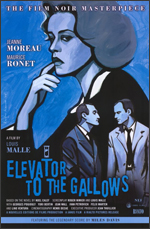| |
1950s |
| |
The 400 Blows, Directed by François Truffaut
All About Eve, Directed by Joseph L. Mankiewicz
Diary of a Country Priest, Directed by Robert Bresson
Elevator to the Gallows, Directed by Louis Malle
Hiroshima Mon Amour, Directed by Alain Resnais
Invasion of the Body Snatchers, Directed by Don Siegel
Night and Fog, Directed by Alain Resnais
Nights of Cabiria, Directed by Federico Fellini
The Night of the Hunter, Directed by Charles Laughton
On the Waterfront, Directed by Elia Kazan
Pickpocket, Directed by Robert Bresson
The Seven Samurai, Directed by Akira Kurosawa
Some Like It Hot, Directed by Billy Wilder
Touch of Evil, Directed by Orson Welles |
|
|
Elevator to the Gallows, Directed by Louis Malle
Ascenseur pour l’échafaud, Lux Compagnie Cinématographique de France, January 29, 1958 (France)
Screenplay: Roger Nimier and Louis Malle (adaptation), Roger Nimier (dialogue), based on the novel Ascenseur pour l’échafaud by Noël Calef
Starring: Jeanne Moreau, Maurice Ronet, Georges Poujouly, Yori Bertin, Jean Wall, Iván Petrovich, Felix Marten, and Lino Ventura
“Do not fear mistakes. There are none.”
-Miles Davis
Certainly, the trumpet master knows of what he speaks. And yet, beyond the realm of jazz improvisation, not only does the possibility of error exist but moreover in forms that can be quite dangerous, even deadly—the type of mistakes that should not only be feared but quite frankly avoided at all costs. It is therefore an interesting dichotomy to overlay a flighty, carefree improvisational musical score by Miles Davis atop Louis Malle’s first feature, Elevator to the Gallows, a film that meanders through a mischievous Paris night as its characters are forced to improvise in kind when a carefully planned murder goes awry. In Malle’s creation, the resulting domino effect tipped from a single blunder gives reasons aplenty to hold firm to a healthy dose of meticulousness and fear over misplaced bravado.
Coincidentally, it isn’t only the mastermind and his femme fatale accomplice that are forced to ad-lib when their naively contrived concoction of a perfect murder does not follow script. In the wake of deviation, two young lovers also find themselves caught in the current, and their parallel story gives the thrilling plot an equally riveting and no less murderous twist.
Perhaps the star of it all is the La Ville-Lumière (The City of Light). Paris is gorgeously shot by Malle and his cinematographer extraordinaire, Henri Decaë. The shadows of the night play perfect foil to the characters who have lost their way. Scenes of sport cars speeding through the darkness lend hazy dreamlike hues over the ill-fated night. The mystery and beauty of the city is captured exquisitely as Malle’s no less ravishing leading lady strolls aimlessly down the romantic city’s lovely-lit rues and sidewalks, cozy corridors, corner cafes, and late night bars. Searching for any trace of her lost lover, she simultaneously looks deeper and deeper within, examining the labyrinth of love that has pushed her to this disquieting precipice.
The terms “perfect” and “murder” do not make good bedfellows. Noir films revel in reassuring that the concept of a perfect murder is erroneous from the start. Mistakes will undoubtedly be made, starting with the birth of the idea itself.
As for the art of filmmaking, missteps are certainly also a very real possibility. But in the hands of Louis Malle, Elevator to the Gallows shines a light on them by conversely employing a deft hand void of any similar trace of imperfection.
-G

|
|
 |

